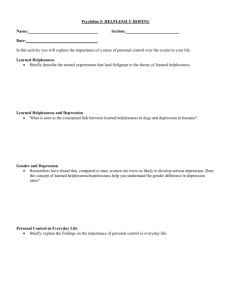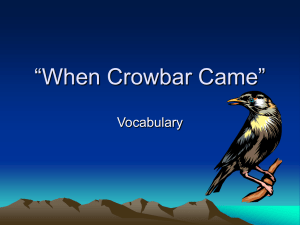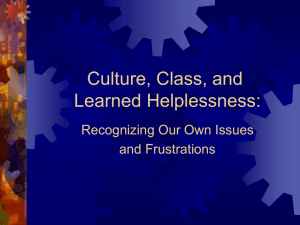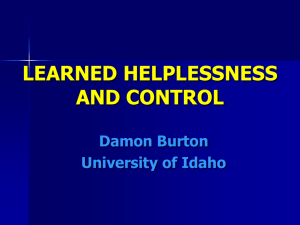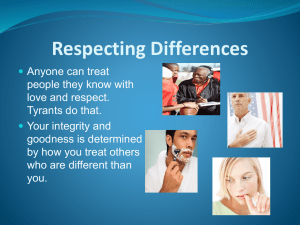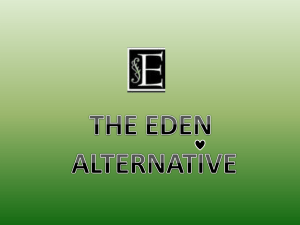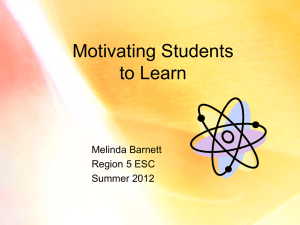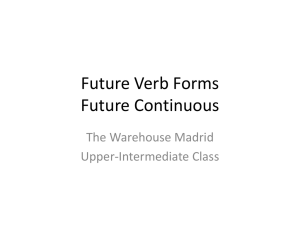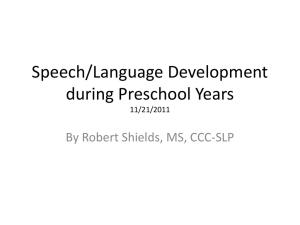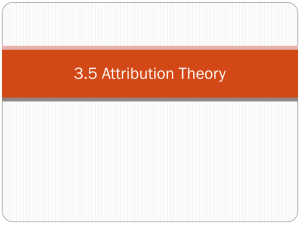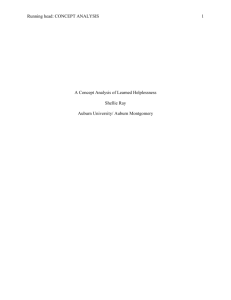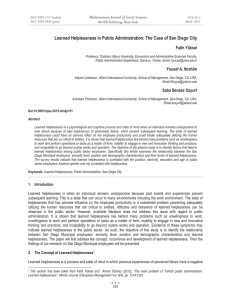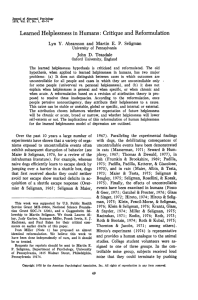2013-10-06 Infancy – The First Frontier, Rev. Jude Geiger
advertisement
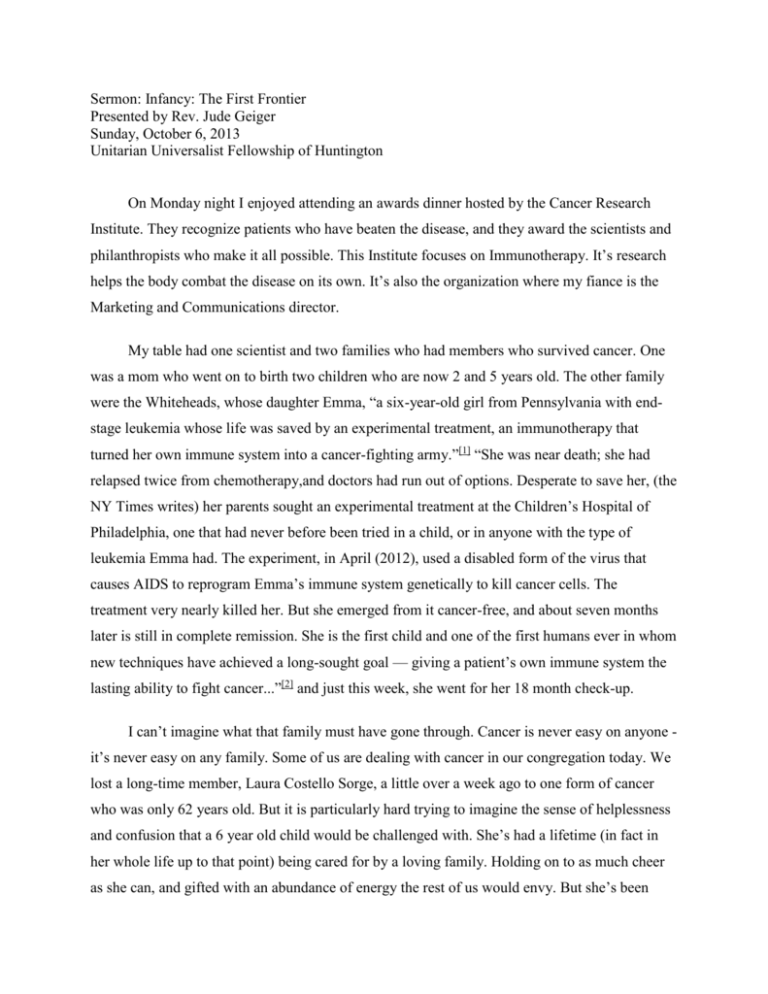
Sermon: Infancy: The First Frontier Presented by Rev. Jude Geiger Sunday, October 6, 2013 Unitarian Universalist Fellowship of Huntington On Monday night I enjoyed attending an awards dinner hosted by the Cancer Research Institute. They recognize patients who have beaten the disease, and they award the scientists and philanthropists who make it all possible. This Institute focuses on Immunotherapy. It’s research helps the body combat the disease on its own. It’s also the organization where my fiance is the Marketing and Communications director. My table had one scientist and two families who had members who survived cancer. One was a mom who went on to birth two children who are now 2 and 5 years old. The other family were the Whiteheads, whose daughter Emma, “a six-year-old girl from Pennsylvania with endstage leukemia whose life was saved by an experimental treatment, an immunotherapy that turned her own immune system into a cancer-fighting army.”[1] “She was near death; she had relapsed twice from chemotherapy,and doctors had run out of options. Desperate to save her, (the NY Times writes) her parents sought an experimental treatment at the Children’s Hospital of Philadelphia, one that had never before been tried in a child, or in anyone with the type of leukemia Emma had. The experiment, in April (2012), used a disabled form of the virus that causes AIDS to reprogram Emma’s immune system genetically to kill cancer cells. The treatment very nearly killed her. But she emerged from it cancer-free, and about seven months later is still in complete remission. She is the first child and one of the first humans ever in whom new techniques have achieved a long-sought goal — giving a patient’s own immune system the lasting ability to fight cancer...”[2] and just this week, she went for her 18 month check-up. I can’t imagine what that family must have gone through. Cancer is never easy on anyone it’s never easy on any family. Some of us are dealing with cancer in our congregation today. We lost a long-time member, Laura Costello Sorge, a little over a week ago to one form of cancer who was only 62 years old. But it is particularly hard trying to imagine the sense of helplessness and confusion that a 6 year old child would be challenged with. She’s had a lifetime (in fact in her whole life up to that point) being cared for by a loving family. Holding on to as much cheer as she can, and gifted with an abundance of energy the rest of us would envy. But she’s been cared for up until this time entirely by her family. At six, she has no agency. She has no ability to make life-decisions on her own. She’s learning about the risk of death in the most intimate way possible. And she’s not at the steering wheel of her own life. She can keep up a great attitude, but her wellness is completely dependent upon others making the best choices they know how to make. Fortunately, in this case, she has one amazing set of parents - and some great doctors. Emma aside, the same goes for every baby that comes into this world. They aren’t able to control, choose, or understand much of anything. I know, some of you parents out there are saying I’m wrong - that at 2am that baby has complete control over your life (and at 4am, and 6am and... and...). But the infant may be able to influence adults, but the child has no agency themselves. If we walk away, they are helpless. Emma wasn’t going to get well on her own. Spiritually, what can we learn from that deep place of helplessness? We can learn that helplessness isn’t inherently a trauma. We are each born into it, and someday each will return to it, but it’s a natural state of living and being alive. Do we approach helplessness as the infant? Having moments of wiggles, having moments of fear, having moments of confusion - but always knowing and trusting the source of life that brought us here? Or do we forget the lesson of the infant? That we’re alone; that there’s no one to help; that helplessness means tragedy? Tragedies of abuse aside, we learn to trust others through our helplessness. Trust - one of our most crucial virtues- means nothing if we always have control and power; if we’re never reliant upon another. Trust also teaches us how to be human. Because helplessness is the normal state of affairs in life. We don’t make ourselves breathe. We don’t bring ourselves into this world. We don’t control the factors of chance or luck that make us thrive or wallow. We are helpless before the love of others, or the lack of love of others. We can’t control our parents’ failings as parents or their successes. We can make the most of our talents, but we didn’t put those talents there, nor did we earn the fortune or poverty of our upbringing. Infancy taught us to trust in the face of helplessness as if our life depended upon it and it did. And it continues to depend upon that trust this very day. If we can’t let go; if we can’t occasionally be powerless; if we can’t lean into trust with another human being - we’re living as less than human. We’re a cog in a wheel that must always turn just the right way. Always produce; always succeed; always win. But never be alive. Be grateful for our moments of helplessness, as best we can, for they open up opportunities to rest in the arms of another loving force that’s all the harder to see when we pretend we’re perfect. Emma’s story has another side to it that was deeply and personally very moving for me. “To perform the treatment, doctors remove millions of the patient’s T-cells — a type of white blood cell — and insert new genes that enable the T-cells to kill cancer cells. (According to the NY Times) [t]he technique employs a disabled form of H.I.V. because it is very good at carrying genetic material into T-cells. The new genes program the T-cells to attack B-cells, a normal part of the immune system that turn malignant in leukemia. ... A sign that the treatment is working is that the patient becomes terribly ill, with raging fevers and chills - a reaction that oncologists call “shake and bake....”.[3] I’ve lost a teacher, a mentor, friends and even two former boyfriends to that ugly disease, HIV. Knowing that virus ... might actually be able to be used... to give some 6 year old girl her life back... is immensely healing for me. That science can turn around something so harmful to bring about life, is amazing. The science also brings a metaphor about helplessness to light. Our child patient will not get healthier without appearing to get worse for a time. The oncologists’ termed “shake and bake” is horrifying to witness as a parent. Your child is on a ventilator and unconscious. She is as helpless as the parent feels. It’s in this state of helplessness that the body heals. It’s in the weakening of the body, that the body learns to kill what is killing it. The helpless child learns to beat one of history’s nastiest killers (Cancer), after being taught how by another one of our nastiest killers (HIV.) There is no amount of usefulness, or productivity, or power that will help all the Emma’s in the world learn how to heal themselves; it’s in the place of weakness that they learn strength. Of course, helplessness does not mean victimhood. It doesn’t mean to learn to seek out places of weakness, or abuse, or violation and stay in them. When there’s an abuse of power in the relationship, helplessness becomes victimhood - and there is no virtue there we need to nurture or seek out. Learning to trust what is worthy of your trust is the spiritual virtue. Learning to deserve another’s trust is also a spiritual virtue. It’s in the exchange of trust and earning trust that we are more fully human. It’s in this exchange that we bring our talents and gifts fully to bear in this world. Sometimes we feel like we’re helpless when all that’s changed is how easy things feel, or how much influence we have in the world, or we no longer wield the same power we once did. That’s not helplessness. That’s change, or letting go, or making room for another to have the same chance you did. When we have more power than the people around us for a very long time, it’s a form of privilege. In letting go of privilege we are not weaker for it, or discarded, or less relevant. We’re being more fully human. In our interdependent world, we are more spiritually alive when we allow others to fill the shoes we once did - and to do so with grace. Newcomers (regardless of age) will need good mentors who have made room for them (regardless of the mentors’ age.) The infant who has grown into adulthood isn’t making the parent irrelevant they’re simply living their life as they were meant to. Roles change with time. Youth and beginnings fade away. Helplessness and inexperience give way and transmute into something else over time. Life does not tarry in yesterday, nor do all roles remain eternal. Helplessness can teach us much. It can also keep us stuck in life. If we’re the type of person who loves to be relentlessly useful (a phrase I routinely borrow from our District Executive, Andrea Learner), we’ll love to enter situations where others are relentlessly helpless, or who simply would rather be cared for in all things. It’s a quality that challenges me personally. I am too often relentlessly useful. As a spiritual community we are called to challenge that when it becomes complacency; or when it deters us from following the responsible search for truth and meaning. Being helpless and being stuck are not the same thing. We should strive to learn from the first, and grow through the latter. If you approach your congregation, or your family, or your job perpetually as the person who’s always got the answer, the only one that could do something right, or you just know in your bones that no one else will step up if you step back - you might be guilty of being relentlessly useful too. It doesn’t mean drop all of your responsibilities, or walk away in disgust that someone does something slightly differently than you would have. It simply means taking a step back, over time, and learning to be a resource. It’s an opportunity to experience new things; to learn new skills; or maybe that other lesson that we learn from childhood that we often forget as adults - to play some more in life. [1] http://cancerresearch.org/news-publications/our-blog/december-2012/a-game-changingmoment-in-cancer [2] http://www.nytimes.com/2012/12/10/health/a-breakthrough-against-leukemia-using-altered-tcells.html?smid=pl-share [3] http://www.nytimes.com/2012/12/10/health/a-breakthrough-against-leukemia-using-altered-tcells.html?smid=pl-share
